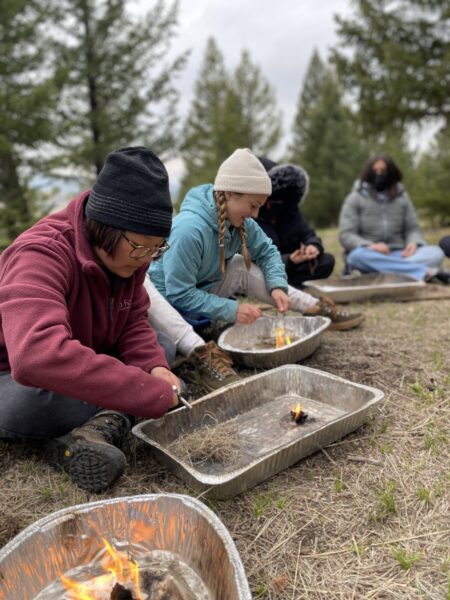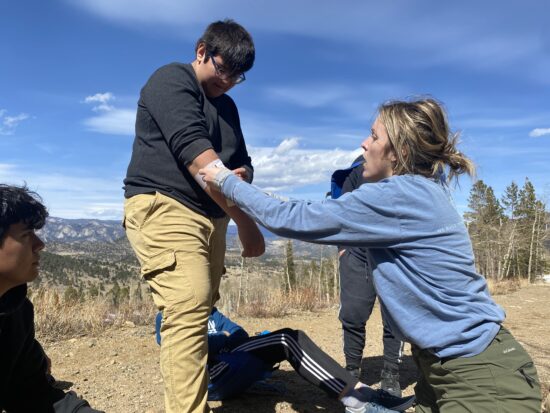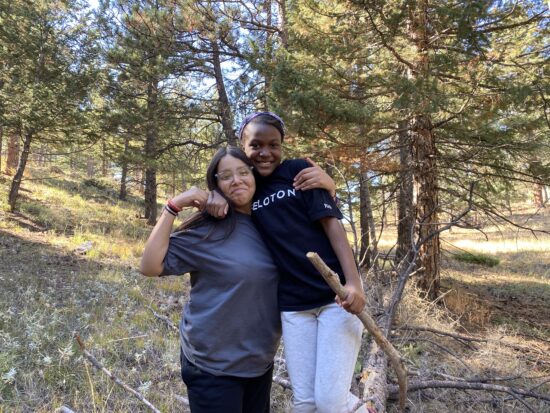Nondiscrimination Statement
Cottonwood Institute (CI) does not discriminate against any person or organization based on age, race, sex, color, creed, religion, national origin, native language, sexual orientation, transgender status, gender identity, gender expression, genetic information, ancestry, marital status, gender, veteran status, military status, political service, affiliation, or disability.
JEDI at Cottonwood Institute
Justice, equity, diversity, and inclusion (JEDI) are fundamental to our mission at Cottonwood, and we strive continuously to further our own understanding of and capacity for radical work that advances justice for and alongside the communities we serve. We hope to be in active alliance with our students, families, partners, and communities, and we welcome feedback on how we can better show up as individuals and as a team. If you know a great partner that we should connect with or have suggestions for our programs, please contact Teagan Papke at teagan@cottonwoodinstitute.org.
Core Values
1. Passion: We share enthusiasm and joy for our mission and our programs.
2. Equity & Inclusion: Our commitment to a more just world is woven into everything we do.
3. Collaboration: We build authentic partnerships with the communities we serve.
4. Connection: We value relationships with each other, our community, and the natural world.
5. Compassion: We care deeply about and invest in the growth and wellbeing of our students, families, and staff.
In our efforts to build a culture that celebrates these values, we’re focusing on development across the following areas:
 Operations
Operations
In the past two years, our Operations Committee has focused on reevaluating our hiring practices to center equity. We minimized unnecessary and exclusive barriers by employing a skills-based hiring approach; assessed our job descriptions to maximize inclusive language; and revamped our selection committee process to reduce bias. But we realize that hiring practices are just the tip of the iceberg when it comes to creating access to equitable and sustainable jobs; deeper justice work requires us to address systemic barriers like historically low industry wages and lack of accessible pathways into the environmental and outdoor fields. As part of this work, we have increased our instructor base pay to lead local like-size nonprofits in compensation and offer field bonuses that recognize the value of critical skills like bilingualism. We are also in our second year of developing an Assistant Instructor Apprenticeship, a stipended position for our program alumni aimed at supporting students in receiving free professional development, training, certification and experience.
 Programming
Programming
CI’s school-based programs are uniquely inclusive in that they are co-created by students and responsive to their strengths, interests and context. As part of their experience, students design and lead an Action Project to address an environmental issue that affects their community. Taking this model further, we engaged 16 students in the co-development of our pilot Changemaker Program. Now entering its third year, we have brought student leaders into the design process through focus groups with returning students and interviews with prospective participants. Student-led design has shifted the program over time; in 2021, we identified relationship-building as our goal in response to the isolation of COVID. This year, students want to focus on service to their community.
 Community Engagement
Community Engagement
Our goal is depth over breadth; we’re prioritizing building authentic partnerships and diving deeper within the communities we serve. We’ve been working with New Vista High School for eighteen years, and with our schools in Lafayette and Aurora for over five years. This year, we continued a multi-year program partnership with Casa de la Esperanza, a Boulder County Housing initiative serving migrant farm workers and their families. We also brought on two new summer program partners in the Westwood neighborhood: Cobbled Streets, providing opportunities and experience for youth in the foster care system, and Lifespan Local, a community solutions group based in southwest Denver. Additionally, we co-wrote a Partnership in the Outdoors grant to collaborate with Environmental Learning for Kids in Montbello, led by board member Juan Perez Saez.
 Training and Development
Training and Development
We believe strongly in the importance of ongoing JEDI learning and dialogue across all levels of our organization. Our Training & Development committee has worked with local experts, including Syah B. and EcoInclusive, to facilitate ongoing JEDI training with our instructors, staff and board members on topics like identity, inclusion, bias, and the cycle of oppression. This coming year, we are hosting a series of facilitated workshops for our instructor team on “inclusivity in action” that focuses on developing awareness of how our identity impacts our relationships and using field-based strategies to create trust between and among students. Additionally, we include JEDI concerns in program debriefs with both instructors and partners and review feedback to inform future training.

 Operations
Operations Programming
Programming Community Engagement
Community Engagement Training and Development
Training and Development